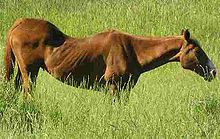The Aging Horse

Older horse with significant swayback.
Image: Wiki/Montanabw
Just like every living thing a horse ages and with that come certain key areas to watch such as: GI tract, heart, immune system, respiratory problems and other internal problems which are not visible. Then there are the visual externals such as overall appearance: sway back, loss of muscle mass, breaking down of tendons and ligaments, no spring in the step, teeth, joints, eyes, and external tumors. As with humans horses also have mental decline--but due to other issues--not senility. Let's take a closer look.
External Appearance
- Sway back
- More prominent withers
- Loss of muscle mass
- The bony look
- Tendons and ligaments lose tone
- Drooping fetlock joints most particularly in the hind legs
- Hollows around the eyes (deep orbits)
- Droopy lips
- Duller coat
- More gray hair around face and neck
- Longer time to blow coat after winter (Could be Cushing's Disease)
- Deformed teeth
Mental Decline
- Loss of vision
- Loss of hearing
- Illness such as encephalitis or Cushing's Disease
- It is thought that horses do not get senile like humans. Their behavioral changes are generally because of other underlying circumstances as those listed above.
Teeth
Older horses should have regular annual checkups for teeth problems. Complications can cause changes in the way the horse is fed. If a horse has pain while eating it can be prone to choke.
Hearing and Vision
- Hearing loss is usually caused by a neurological problem.
- Uveitis (moon blindness) and cataracts can cause vision loss.
- Rarely Cushing's Disease can impair vision.
Joints
Equine Osteochondrosis Terminology Revamped 
"If you've ever been confused by the differences between osteochondrosis and osteochondritis dissecans, or wondered whether these are the same as developmental orthopedic disease (DOD) or just examples of it, you're not alone. For decades, diseases of the bones, joints, and cartilage in young horses have sparked many word-slinging debates among researchers. ..." Read more.
New Osteochondrosis Lesion Scoring System Developed 
GI Tract
Reproduction
- Both mares and stallions become less fertile.
- Arthritis can have an affect on breeding ability (live cover).
Heart 
- Valve degeneration or leaky heart valves (sometimes referred to as "old heart".
- Atrial fibrillation.
- Aorta deterioration.
Immune Deficiency
Tumors
- Cancer such as melanomas and squamous cell carcinomas
Melanomas are often seen in gray horses. Unpigmented skin around the eyes, prepuce and vulva often develop squamous cell carcinomas. With cancer there will also be weight loss. You should watch for this.
- Thyroid, adrenal and pituitary problems and GI tract polyps
- Lipomas
For More Information:
How Does Transport Impact Senior Horse Immune Function?
Geriatric (Older) Horse 
Horse Vision
Blind Horses Circling
|